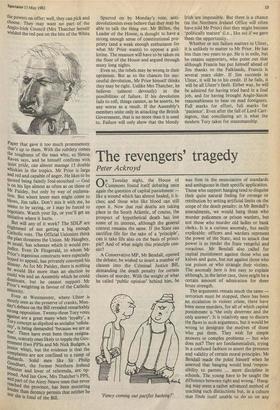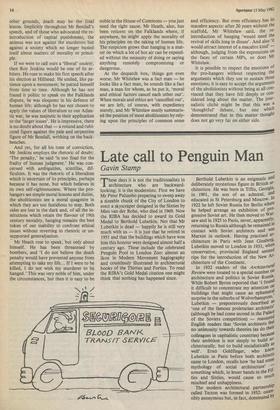The revengers' tragedy
Peter Ackroyd
On Tuesday night, the House of Commons found itself debating once again the question of capital punishment like a wound which has almost healed, it it- ches; and those who like blood can still open it. Now that real deaths are taking place in the South Atlantic, of course, the prospect of hypothetical death has lost some of its interest, although the general context remains the same. If the State can sacrifice life for the sake of a 'principle', can it take life also on the basis of princi- ple? And of what might this principle con- sist?
A Conservative MP, Mr Bendall, opened the debate; he wished to insert a number of clauses into the Criminal Justice Bill, demanding the death penalty for certain classes of murder. With the weight of what he called 'public opinion' behind him, he
`Fancy corning out pacifist bashing?'
was firm in the enunciation of standards and ambiguous in their specific application. Those who support hanging tend to disguise their quite natural feeling for revenge or retribution by setting artificial limits on the scope of the death penalty: in Mr Bendall's amendments, we would hang those who murder policemen or prison warders, but not those who murder old ladies or bank clerks. It is a curious anomaly, but easily explicable: officers and warders represent the power of the State, and to attack that power is to render the State vengeful and voracious. Mr Bendall also called for capital punishment against those who use knives and guns, but not against those who use poison or who strangle their victims. The anomaly here is less easy to explain although, in the latter case, there might be a certain amount of admiration for sheer brute strength.
The arguments remain much the same terrorism must be stopped, there has been an escalation in violent crime, there have been more murders, for all of which capital punishment is 'the only deterrent and the only answer'. It is relatively easy to discern the flaws in such arguments, but it would be wrong to denigrate the motives of those who put them. They wish for simple answers to complex problems — but who does not? They are fundamentalists, trying in a confused fashion to assert the presence and validity of certain moral principles. Mr Bendall made the point himself when he asserted that hanging would lend 'respon- sibility to parents ... more discipline in schools. The young have to be taught the difference between right and wrong.' Hang- ing may seem a rather advanced method of teaching such distinctions but, in a culture that finds itself unable to do so on any other grounds, death may be the final lesson. Implicitly throughout Mr Bendall's speech, and of those who advocated the re- introduction of capital punishment, the animus was not against the murderers but against a society which no longer busied itself about matters of morality or princi- ple.
If we were to call ours a 'liberal' society, then Roy Jenkins would be one of its ar- biters. He rose to make his first speech after his election at Hillhead. He smiled, like pa- tience upon a monument; he patted himself from time to time. Although he has not found it politic to speak on the Falklands dispute, he was eloquent in his defence of human life; although he has not chosen to apply the values of liberalism to our Atlan- tic war, he was majestic in their application to the 'larger issues'. He is impressive, there is no doubt about that — a rotund and rubi- cund figure against the pale and serpentine figure of Mr Bendall, writhing on the back- benches.
And yet, for all his tone of conviction, Mr Jenkins employs the rhetoric of doubt: 'The penalty,' he said 'is too final for the frailty of human judgment.' He was con- cerned with ambiguities, scintillas, dif- ficulties. It was the rhetoric of a liberalism which is uncertain of its principles, perhaps because it has none, but which believes in its own self-righteousness. Where the pro- hangers see simple moral lessons and duties, the abolitionists see a moral quagmire in which they are too fastidious to step. Both sides are lost in the dark and, of all the in- stitutions which retain the flavour of 19th century morality, hanging remains the hest token of our inability to confront ethical issues without reverting to rhetoric or un- supported generalisation.
Mr Heath rose to speak, but only about himself. He has been threatened by bombers, and 'I do not believe the death penalty would have prevented anyone from attempting to take my life... If I were to be killed, I do not wish my murderer to be hanged.' This was very noble of him, under the circumstances, but then it is easy to be noble in the House of Commons — you just need the right cause. Mr Heath, also, has been reticent on the Falklands where, if anywhere, he might apply the morality of his principles on the taking of human life. The suspicion grows that hanging is a mat- ter on which a lot of hot air can be expend- ed without the necessity of doing or saying anything remotely compromising or dangerous.
At the despatch box, things got even worse. Mr Whitelaw was a fact man — he looks like a fact man, he sounds like a fact man, a man for whom, as he put it, 'moral and ethical factors cancel each other out'. When morals and ethics are 'cancelled out', we are left, of course, with expediency merely, and Mr Whitelaw neatly summaris- ed the position of most abolitionists by rely- ing upon the principles of common sense and efficiency. But even efficiency has its macabre aspects: after 20 years without the scaffold, Mr Whitelaw said, the re- introduction of hanging 'would need the revival of skills long in disuse'. And also would attract interest of a macabre kind' — although, judging from the expressions on the faces of certain MPs, so does Mr Whitelaiv.
It is possible to respect the emotions of the pro-hangers without respecting the arguments which they use to sustain those emotions; it is easy to accept the arguments of the abolitionists without being at all con- vinced that they have felt deeply or con- sidered long about the matter. The jour- nalistic cliché might be that this was a `thoughtful' debate, but one which demonstrated that in this matter thought does not go very far on either side.







































 Previous page
Previous page